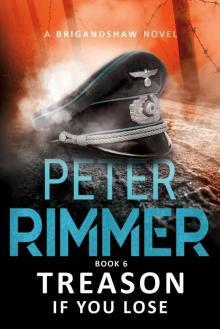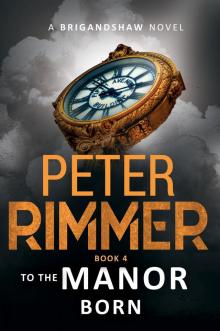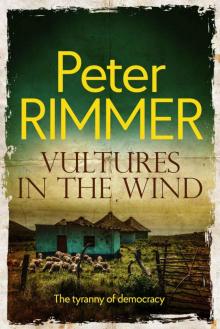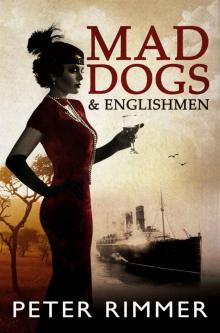- Home
- Peter Rimmer
Treason if You Lose Page 2
Treason if You Lose Read online
Page 2
Anthony, looking from the small boat to the sleek yachts with the tall masts still far away, white sails leaning with the wind as they tacked towards the shore, gave Mr Tannenbaum a brief smile and said nothing. Out on the lake it seemed to Anthony the wind was picking up, the three yachts slanting beautifully to the water.
“Will the Swiss chocolate cake be ready now?” he said, changing the subject and the direction of Mr Tannenbaum’s family avarice.
“Of course, young man. Just the aroma of them baking makes my mouth water.”
“You think our cases are safe?” asked Harry. The small bell attached to the door tinkled as they went inside, the horse and trap having gone from the jetty towards the town.
“Not so many customers at this time of day. No one steals anything in Romanshorn. Where are they going to go? Up in the mountains with small suitcases?” Mr Tannenbaum, finding his own joke to his liking, laughed so much his fat belly above the thick leather belt began to roll in front of Anthony’s eyes, causing Mr Tannenbaum to slap Anthony on the back. “You like that one? Now, let us go and sit down. It is so good speaking English. I like speaking English. Very good language, English. That one over there is my wife’s brother.”
Trying not to laugh at the other side of Tannenbaum’s humour, that he doubted the man understood, Harry pulled out a small chair and sat down at the table. Apart from themselves, the wife’s brother was the only person in the long room.
“Some friends of mine from Bavaria told me about your beautiful town, Mr Tannenbaum. Please order for yourself whatever you would like. Do you know them perhaps, Frau and Herr von Lieberman? Their children, like my son of the same age, are fond of sailing.”
“Maybe several slices of chocolate cake to start with?” With Harry’s confirmation the brother disappeared into the kitchen.
“Here they come,” said Anthony. It was clear, even to Anthony, they were all in good hands. “Here comes Tinus and Mr Crookshank. That was quick work in a rubber dinghy with paddles.”
“It would be. Phil’s trying to show off. Coastal Command, Anthony.”
To Anthony’s surprise the man Tannenbaum looked up sharply. Then the cakes arrived at the table and took everyone’s attention.
“Better order some coffee as well,” said Harry to cover up his gaffe. “So you don’t know my friends Klaus and Bergit? Or their children?”
“Why do you ask?”
“We heard the girls are holidaying on this side of the lake.”
“Who told you?”
“Their mother, as a matter of fact.”
“Excuse me, got to see my wife’s brother in the kitchen.”
“What about your cake?”
Without a word, the man stalked off from the table by the window above where Tinus and Phillip were clambering out of the rubber boat below the steps.
Like so many previous times in Harry’s life, he told himself, nothing was ever a coincidence. From the outward appearance of a garrulous fool, the man’s eyes had changed along with the tone of his conversation. There was no doubt in Harry’s mind, the man from customs knew the von Liebermans. Maybe living on a border was not so peaceful after all. Nothing ever was what it looked to be at first sight. The jolly old man underneath the rolls of fat now seemed to have more to worry about than digging up business for his relatives, the reason for the suitcases going off on their own more apparent. Luckily, Harry had not locked the cases so the locks would not have to be broken if the police chief wished to look inside.
“Come and join us, Phil,” said Harry through the window that was open to the afternoon sun. “Our friend has gone off for coffee. It’s all very pretty but there’s a distinct chill in the air. Be careful none of us catch a chill before we fly back to England. You can never be too careful in a foreign country however good the welcome. I hope you both like chocolate cake? These, I understand on good authority, are the best in the world. Really. Believe me. Our cases have gone on to the hotel. How was the dinghy ride?”
“Swift and accurate. I love chocolate cake. Just the smell had my mouth watering from down on the water. We came ashore quickly, don’t you think? I put sea anchors out on four sides so the wind coming up won’t be a problem. There’s nowhere to tie up the flying boat even if we wanted. This little harbour is far too small. What’s the matter, Harry?”
“I don’t know. After nearly three years as an unwilling guest of the Tutsis in the Congo, my antennae are always on the alert away from home. She looks beautiful from here, resting in the water. An aircraft should always be beautiful as well as functional.”
“We’re coming up. Where are the reception committee?”
“That’s my point. We’ve been left here with the slices of chocolate cake.”
“I’ll come and help you,” said Tinus, tying the painter to the pole next to the rowing boat that had brought Harry and Anthony from the flying boat.
By the time the other two joined them at the table there was still no sign of anyone. They were completely alone. Harry passed the slices of cake around to them all. No one spoke while they ate, all of them smiling.
Herr Tannenbaum returned long after the last crumb of chocolate cake had been eaten, Harry not sure what to do in the meantime. He had looked at his watch three times. When the fat man came back he was beaming again, the large bald part of his pate shiny and red, as if he had put his head in a hot oven. It seemed that the coffee had been forgotten. At the same time, his wife’s brother appeared with a plate of small cakes and a large savoury dish.
“He says to try his savoury cooking. Baking cakes is a sideline, I think you say. This dish is a fondue. We Swiss are famous for our cheeses. I am proud to say this is my wife’s brother’s special recipe for savoury melted cheese. We eat it with freshly baked bread by dipping the pieces of bread into the cheese. You will find it is delicious.
“Frau von Lieberman sends her regards, Colonel Brigandshaw. I had no idea you were the Englishman who saved Herr von Lieberman’s life. We Swiss are neutral. Herr Krock made the phone call. We are determined not to be involved in the rest of Europe’s problems. We are too small. We Swiss pride ourselves on being discreet with privileged information. Herr Krock asks you to enjoy your night at my cousin’s hotel and leave first thing in the morning. Now, my friends, let us eat fondue. You see, British flags waved from aircraft can make our friends across the water ask Herr Krock questions. He has explained who you are. A family friend of the von Liebermans. The chances of an official test flight to this backwater of Switzerland was too much for Herr Krock. He has a mind that looks for the not so obvious to keep our little town as quiet as your proverbial mouse. You do understand, Colonel Brigandshaw?”
“Did Bergit von Lieberman ask that we leave?”
“How would I know, Colonel Brigandshaw? Herr Krock made the phone call. Isn’t the fondue delicious? Be careful not to burn your tongue. Something easily done when eating a piping-hot fondue. Your cases are in your rooms. Your very good rooms. Now, if you give me your passports I will stamp them with your entry permits. Tomorrow I will stamp them again with your exit permits. We Swiss are, to use one of your words I like so much, sticklers for detail. It is how we have kept our noses clean over so many years. When those yachts tacking towards us out on the lake reach our small harbour, I will tell Melina and Gabby von Lieberman you are here. Their mother said they would wish to be courteous and make your acquaintance, Colonel Brigandshaw. After all, without your chivalry they would not be alive, if you see my point; their parents would not have had the opportunity to marry and have a family.”
“Not having met their girls before, it would be good to meet them.”
“They are polite, lovely young ladies.”
“Are they pretty?” asked Anthony.
“That is for you to see, young man. How did you know, Colonel Brigandshaw, the girls sail from our little harbour?”
“I didn’t. You are right. This fondue is delicious.”
Smiling at Swiss diplomacy
, Harry looked at the three yachts. By late afternoon they would enter the small harbour.
2
Melina von Lieberman had been the first to hear the sound of an aircraft engine, both her older brother Erwin and her father Klaus being flyers. To her young ears accustomed to single-engined aircraft from when the family visited the small aerodrome near the family’s estate, the sound was different, deeper, and somehow to Melina, menacing. Once she had flown with her father and ever since asked him to teach her to fly an aeroplane the way he had started Erwin on his path to becoming a qualified pilot. Anything Erwin did in his life was perfect, ever since she could remember as a small girl growing up on a big estate that had been in her family for centuries. She had hero-worshipped her brother for being so good at everything he put his mind to, from riding a horse like the wind to flying an aeroplane to emulate their father, an ace in the German Air Force that Herr Hitler was now calling the Luftwaffe. What Melina wanted most in her life was to find a young man just like her brother and marry him.
Melina had listened a full minute before she was certain, the only other sound in the air the occasional flapping of the big sail as it tried to catch enough wind to let the boat tack its way in towards the distant harbour of Romanshorn. With the light wind blowing, they tacked three hundred yards to make ten in the right direction. When she was convinced the engine sound was coming their way, the vibrations more in the air than her ears as the wind came and went, she called across to Monsieur Montpellier at the tiller. Monsieur Montpellier was the owner of the boat and father of her schoolfriend Françoise. Françoise was sitting on the edge of the boat between Melina and Melina’s sister Gabby, ready to lean back with the crew if the wind picked up and pushed the yacht over at an angle to the water.
“There’s an aircraft flying this way,” she said in perfect French.
“I hear nothing. Where would they land? No aeroplanes fly this way, my dear.”
“I can hear it,” said Gabby.
“So can I,” said Françoise.
For the next few minutes the crew listened more to the throbbing of the distant engines than the sound of the wind in the sails. Some were curious, most were excited at the prospect of seeing an aeroplane.
“Well, Melina, you were right. The engine sound is coming this way,” said Monsieur Montpellier, keeping his careful eyes on the sails. “Going about,” he called into the still, mountain air before bringing his boat about to continue his tack with the other two yachts towards the distant church spire of Romanshorn, the target of his approach.
“There it is! Just above the water. At the end of the lake,” called Melina. “It’s a German aircraft, I’ll bet. My father and brother are pilots.”
They all watched, convinced by Melina’s knowledge of aeroplanes that the aircraft was German, the Germans on board smiling, the Swiss not so sure.
“There must be something wrong,” said Monsieur Montpellier, standing up for a better look while still holding on to the tiller. “It’s going to come down in the lake. Oh, my God. There’s going to be a terrible accident.”
“I don’t think so,” said Melina, triumphantly. “German aircraft don’t crash. It’s a seaplane. Going to land on the lake near Romanshorn. I’m sure they’ll know my father. Just look at it. It’s touched the water. A big, big bird sending spray high behind into the air. Beautiful. Just beautiful. I feel so proud to be German. Just look how big it is.”
In her excitement, Melina was standing. Miles away beyond the lake, the white caps of the Alps made a perfect backdrop for the spectacle. Melina was hugging herself with excitement.
“It’s turned towards Romanshorn. I was right,” she said, surprised she was the only one who was excited.
“Sit down, Melina, or you’ll fall out of the boat and the water’s cold,” said Gabby, once again in the shadow of her sister, something she hated.
“What a magnificent seaplane.”
“Must be a passenger plane,” said Monsieur Montpellier, training his Zeiss glasses on the seaplane as it taxied in on what seemed through the glasses to be two of its four engines towards the shore. “Goodness. Four engines. Lands on its hull, the wing floats just to keep it stable. Civilian, not military. I didn’t know anything that big could fly. There are no markings on the fuselage or the wings. We are going to have interesting company at the hotel tonight. Everyone be ready. We’re going to come around again if the wind will hold. There’s more wind over in Germany by the look of the flag on the stationary German patrol boat. The wind over there is moving the German flag.”
“Slipstream from the propellers,” said Melina smugly. “The motorboat is almost awash. Why did they get so close?”
“To have a good look, Melina. Oh yes, to have a good look. There’s a flag being pushed out from the cockpit window by the look of it. A Union Jack it seems. Melina, that seaplane is not German. It’s British.”
“Then what is it doing here?” said Melina, somewhat deflated as she sat back down again, her young mind beginning to race; even at three months short of her sixteenth birthday the coincidence was far too great.
Ever since Melina experienced her first family fight she had always sided with her brother Erwin, even when she knew he was wrong. Apparently wrong, Erwin always had a good reason. The letter from Erwin to Monsieur Montpellier’s house in Geneva arrived for her before they left for the lake and their three-week sailing holiday where they were to stay at the Romanshorn hotel. Monsieur Montpellier owned houses in Geneva and Marseille. Owning the boat at Romanshorn was enough. Madam Montpellier, not being a good sailor, preferred to stay in Geneva when her family went sailing, making a hotel to stay in more convenient than a house for her husband. Françoise had said, when they had first met at school in Geneva, her father was a banker.
The banker was a lot older than his young wife, giving Melina and Gabby a fit of the giggles when they left for the lake, both girls sure their schoolfriend’s mother preferred being left on her own to pursue more pleasant arrangements than sailing an old boat up and down a lake. It was Gabby who loved the sailing, Melina on her fourth trip not so sure. Apart from Françoise and Gabby, every person on board was old, a constant change of business friends who came for the day to enjoy being entertained by Monsieur Montpellier. Switzerland, unlike Germany, Melina had commented sourly to Gabby, was a morning’s train ride from anywhere.
With the British seaplane rocking the German patrol boat and the family estate just over the border, Melina wondered if the letter from her brother was the connection. Thinking hard, she let her brother’s letter play again through her mind. The letter was postmarked Berlin.
‘They’ve probably taken father away by now so don’t take any notice of mother. She’s hysterical. Mother and I had one terrible row after father wanted me to leave Berlin. The Hitler Youth have agreed to keep me at school for my last year, father saying we’ve run out of money. Then I join the Luftwaffe to serve our Fatherland. Germany will rise again, Melina. Never forget that. Whatever they say, Germany must rise again or we are nothing. Father will learn like the others. People are either for the Fatherland or against the Fatherland. Those against, are our enemies. Father, like Uncle Werner, will again be a loyal member of the Nazi Party or he will no longer be our father. Mother must learn to understand. Very soon there is going to be a war that Germany will win. I am so proud to be a German, you have no idea, my darling sister. You too must be proud. The family must all be proud or I can have nothing more to do with them, you understand.’
Two hours later, when the three yachts came into the small yacht basin passing the British seaplane on the way, Melina was sure something was seriously wrong with her family. That her father had done something terribly wrong. On the jetty in front of the restaurant stood Herr Krock with Herr Tannenbaum alongside four men.
“I wonder who they are?” said Gabby.
Melina went cold, her premonition of disaster stronger than ever.
“I don’t know… I hope this has nothin
g to do with what Erwin wrote,” she murmured to her sister, once again thinking back to her letter from Erwin.
“What do you mean? Daddy says Erwin’s coming home. He’ll be home when we get back… Françoise, can we get some chocolate cake? I’ve got a little money. While your father is tying up the boat we can go to the cake shop on the pier… Look at that, Melina. That man is waving at us as if he has come to meet the boat. Oh good. Maybe he’ll buy the cake? Are you coming, you two? Is there something wrong, Melina? You can be so funny sometimes. Now that was a lovely sail.”
One by one, the three yachts found their anchor buoys and tied up for the night, having first dropped most of the crew and the passengers on the jetty. Gabby was smiling at Harry Brigandshaw and the young boy standing next to him, having just been introduced by Mr Tannenbaum. She found it funny standing on shore after so many hours on the boat, the jetty still seeming to move despite the swell of the boat no longer being under her feet. Something was wrong with Melina but something was often wrong with her. Gabby had found it better to humour her older sister rather than ask questions. As the youngest of the trio it was her job to tag along behind.
With her mind set on chocolate cake, Gabby was smiling at everyone. Next to the boy was a young man and next to Mr Brigandshaw, another man the same age as him.
Then, quietly she said to Melina, “I remember now, that man saved Daddy’s life. That must be his seaplane. He and Daddy were both pilots. Maybe we can go up in the aeroplane? I do hope he buys the cake. Why are you looking so sour, Melina?”

 Treason if You Lose
Treason if You Lose Just the Memory of Love
Just the Memory of Love On the Brink of Tears
On the Brink of Tears To the Manor Born
To the Manor Born The Brigandshaw Chronicles Box Set
The Brigandshaw Chronicles Box Set Vultures in the Wind
Vultures in the Wind Mad Dogs and Englishmen (The Brigandshaw Chronicles Book 3)
Mad Dogs and Englishmen (The Brigandshaw Chronicles Book 3) Echoes from the Past (The Brigandshaw Chronicles Book 1)
Echoes from the Past (The Brigandshaw Chronicles Book 1) Elephant Walk (The Brigandshaw Chronicles Book 2)
Elephant Walk (The Brigandshaw Chronicles Book 2)